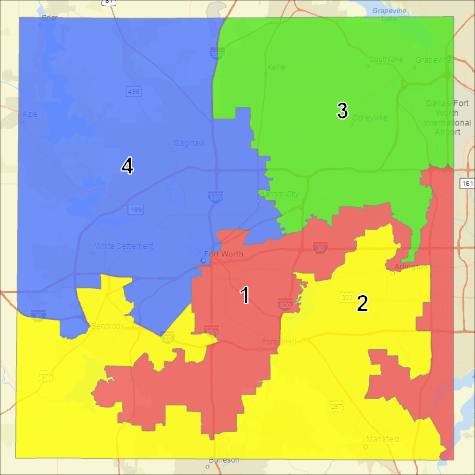June 3, 2025 Story by: Editor
This article has been updated to include information from “We Will Not Be Drawn Out,” an article written by Roderick Miles, Jr., Tarrant County Commissioner for Precinct 1.
After nearly five hours of public testimony and heated debate, the Tarrant County Commissioners Court approved a new redistricting map on Tuesday afternoon.
A Partisan Push for Map 7
The 3–2 vote fell along party lines, with Republican County Judge Tim O’Hare, Commissioners Matt Krause and Manny Rodriguez supporting Map 7, a redistricting plan drawn by the conservative-aligned Public Interest Legal Foundation (PILF). Democratic Commissioners Alisa Simmons and Roderick Miles Jr. opposed the measure, with Miles unsuccessfully attempting twice to delay the vote.
“This process was launched without new data and done without public dialogue,” Miles said during the meeting.
Map 7 was introduced less than a week before the vote, bypassing the four public meetings previously held to discuss redistricting options. Critics argue that the map was crafted to entrench Republican power by reshaping precinct boundaries in ways that dilute minority voting strength and shift Democratic-leaning areas into Republican-controlled districts.

Photo caption: Tarrant County Commissioners Court approved an agreement with the Public Interest Legal Foundation (PILF) to provide legal guidance and consulting on possible changes to the commissioners’ district boundaries for the 2026 Primary and General Elections. (Photo courtesy of: Tarrant County)
Impact on Precincts and Communities
One of the most significant changes under Map 7 is the redrawing of Precinct 2, currently represented by Democratic Commissioner Alisa Simmons. The new boundaries move key areas, including Arlington’s sports stadiums and hotels, into the Republican-controlled Precinct 3. Simmons, who is up for reelection in 2026, expressed concern that the redistricting effort aims to unseat her by altering the demographic makeup of her precinct.
“This is about removing me from office by breaking up my supporters,” Simmons told a crowd of protesters gathered outside the G.K. Maenius Administration Building before the vote.
Public Outcry and Legal Challenges
The redistricting vote prompted widespread public outcry. More than 250 individuals signed up to speak during the Commissioners Court meeting, with the majority opposing the new map. Local leaders, including the mayors of Arlington, Mansfield, and Forest Hill, urged the court to delay the vote and allow for more community input.
Outside the courthouse, approximately 100 protesters rallied against the redistricting plan, holding signs and chanting slogans condemning the effort as racially discriminatory. Civil rights organizations, such as the Texas Civil Rights Project, have indicated plans to mount legal challenges against the new map, citing concerns over potential violations of the Voting Rights Act.
‘We Will Not Be Drawn Out’
“In Fort Worth’s historic Lake Como neighborhood, a wall once stood. Not a metaphor, but a literal wall, built to divide Black families from the rest of the city,” Roderick Miles, Jr, Commissioner of Precinct 1, Tarrant County said. “Today, that wall is gone, but its legacy lives on. It is now reinforced not by concrete, but by the lines of a conservative gerrymander that threatens to once again isolate and disenfranchise a community.”
“My own district, Precinct 1, includes many of the Black and Brown neighborhoods that are central to our county’s history. Now, it’s being manipulated and packed. The map approved Tuesday concentrates voters of color into one district, freeing up adjacent areas to be drawn whiter and more conservative. The clear target is Precinct 2, a district that also empowers communities of color and is currently represented by the only Black woman on our Commissioners Court. The new map, if it stands, would effectively erase her seat, along with the voices, hopes, dreams and lived experiences of the communities she represents.”
“This is gerrymandering by cracking and packing. It is not a new tactic, but it is being used with precision. It is the New Jim Crow, not in rhetoric, but in effect. And it is not limited to Tarrant County.”
“We have seen this tactic play out across the South. In Galveston County, a federal court recently ruled that local officials — also represented by PILF — had violated the Voting Rights Act by dismantling the county’s only majority-minority precinct. (That ruling was reversed by the 5th Circuit Court of Appeals, perhaps the most conservative appeals court in the country.) In Alabama, Black voters had to take their fight for fair maps all the way to the U.S. Supreme Court, where they secured a victory, forcing the state to draw a second majority-Black congressional district. In Georgia, multiple maps were struck down for intentionally undermining Black political power. The common thread is clear: efforts by those in power to maintain it by breaking apart communities of color and counting on silence, fatigue or distraction to succeed.”
“We have been here before. Our ancestors faced poll taxes, literacy tests and fire hoses. Today, we face manipulated data, procedural loopholes and digital gerrymandering. The tools have changed, but the goal remains the same: to deny us a voice in our own future.”
Judge O’Hare’s Stated Intentions
County Judge Tim O’Hare has been transparent about his motivations for redistricting. In previous statements, he described the effort as fulfilling a campaign promise to increase Republican representation on the Commissioners Court. “My plan and what I campaigned on openly and publicly, dating as far back as May 2021, is to pass a map that guarantees, or comes as close as you can to guarantee, three Republican commissioners,” O’Hare said.
Critics argue that such admissions underscore the partisan nature of the redistricting process and raise questions about the fairness and legality of the new map.
Looking Ahead
With the approval of Map 7, Tarrant County’s political landscape is poised for significant changes ahead of the 2026 elections. However, the controversy surrounding the redistricting process suggests that legal battles and continued public opposition are likely in the coming months.
As the county navigates these challenges, the debate over representation, fairness, and the integrity of the redistricting process remains at the forefront of local politics.
Source: CBS News / Democracy Docket / Kera News / NBCDFW / Star-Telegram / Tarrantcountytx.gov

















